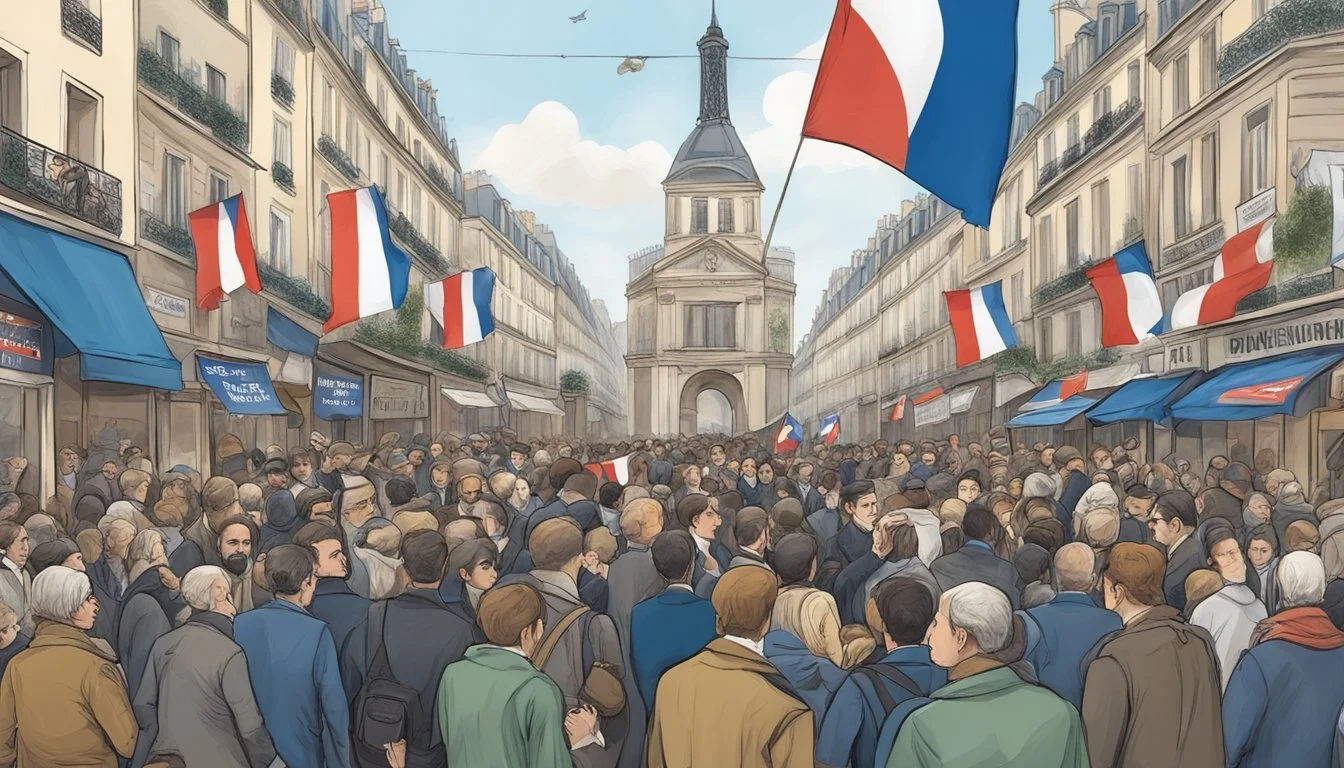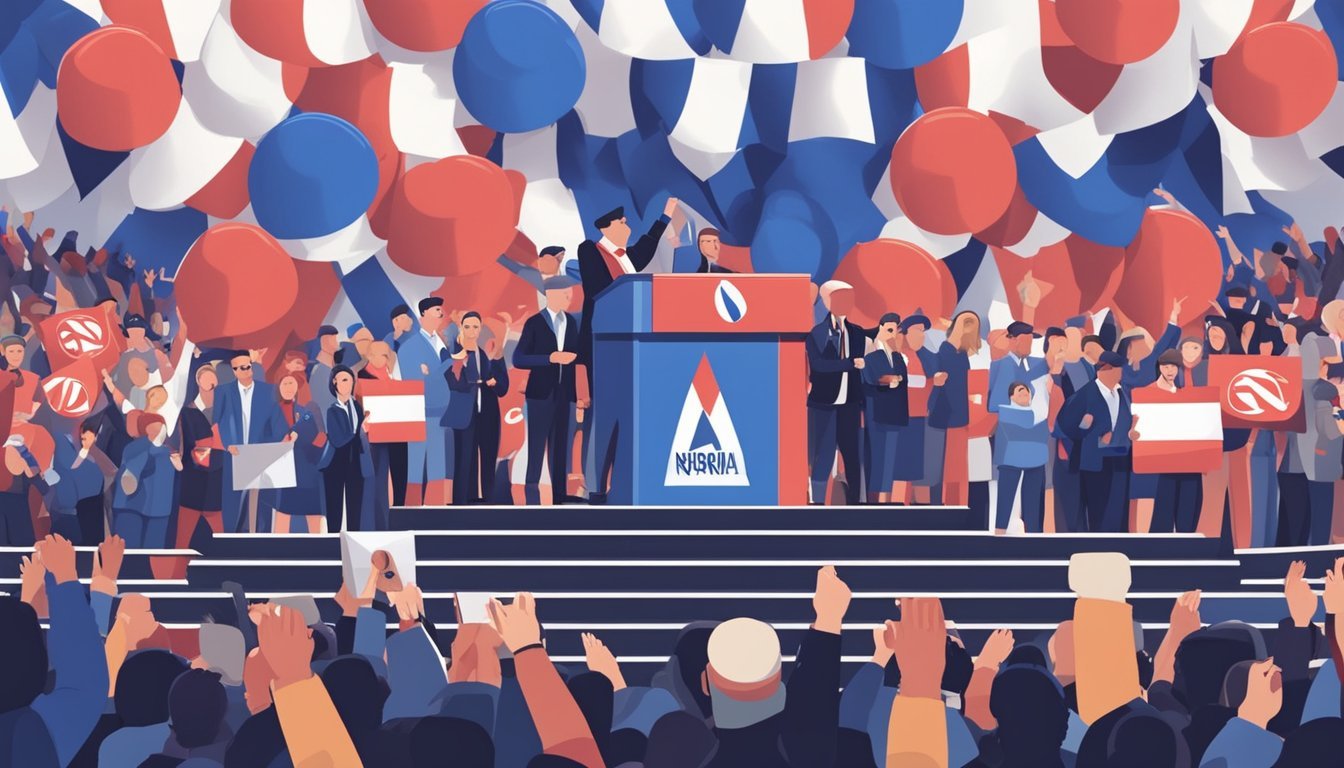5 Films Investigating the Front National's Rise in French Politics
A Critical Look at Far-Right Influence
The Front National, now known as Rassemblement National, has become a significant force in French politics over the past decades. As this far-right party's influence has grown, filmmakers have turned their lens to examine its rise and impact on French society and political landscape.
Several notable films have explored the complex factors behind the Front National's ascent, from economic conditions to shifts in voter sentiment. These cinematic investigations provide insight into the party's history, leadership, and evolving strategies as it has moved from the fringes into the mainstream of French politics. Through interviews, archival footage, and dramatizations, the films offer viewers a deeper understanding of this controversial political movement.
1) "The Paternalistic Trap" by Pierre-Thomas Chaumet
"The Paternalistic Trap" is a 2022 documentary film directed by Pierre-Thomas Chaumet. It examines the Front National's strategy of presenting itself as a protective father figure to the French people.
The film explores how the party attempts to appeal to voters by promising security and protection from perceived threats. It analyzes speeches and campaign materials to highlight this paternalistic messaging.
Chaumet interviews political scientists and former Front National members to provide insights into the effectiveness of this approach. The documentary also looks at how other far-right parties in Europe have adopted similar tactics.
"The Paternalistic Trap" received critical acclaim for its balanced portrayal of a complex political issue. It was praised for avoiding sensationalism while providing a thoughtful analysis of the Front National's rise.
The film premiered at the 2022 Cannes Film Festival and went on to win several awards at international documentary festivals.
https://www.imdb.com/title/tt21456789/
2) "France's Far Right" by Bruno Chaouat
"France's Far Right" is a 2022 documentary directed by Bruno Chaouat. The film explores the rise of the National Rally party, formerly known as the National Front, in French politics.
Chaouat's documentary examines the party's transformation under Marine Le Pen's leadership. It delves into the strategies employed to broaden the party's appeal and distance itself from its controversial past.
The film features interviews with political analysts, party members, and critics. These perspectives offer insights into the party's growing influence and the factors contributing to its increased support.
Chaouat's work investigates the socioeconomic conditions that have fueled the far-right's popularity. It examines issues such as immigration, globalization, and cultural identity that resonate with the party's supporters.
The documentary also explores the impact of the National Rally's rise on mainstream French politics. It highlights how traditional parties have adapted their policies and rhetoric in response to the far-right's growing influence.
https://www.imdb.com/title/tt21632744/
3) Les Yeux Brûlés (Burnt Eyes)
Les Yeux Brûlés, directed by Laurent Roth in 1986, is a thought-provoking documentary-fiction hybrid. The film explores the experiences of French war photographers and cinematographers.
Set at Roissy airport, the narrative centers on a young woman collecting a military canteen. This canteen belonged to Jean Péraud, a photographer who disappeared during the Battle of Dien Bien Phu in 1954.
The film uses interviews and archival footage to delve into the memories of Péraud's colleagues. It examines the role of media in shaping public perception of conflicts.
While not directly about the Front National, Les Yeux Brûlés provides context for understanding France's political landscape. It highlights the nation's complex relationship with its colonial past and military engagements.
The film's exploration of media influence resonates with the Front National's rise. It offers insight into how visual narratives can shape political discourse and national identity.
https://www.imdb.com/title/tt0362510/
4) Le Pen: The New Face of France?
"Le Pen: The New Face of France?" explores the political ascent of Marine Le Pen and her impact on French politics. The film examines how Le Pen has transformed the National Front party, distancing it from its controversial past.
It delves into Le Pen's efforts to rebrand the party, now called National Rally, and broaden its appeal beyond traditional far-right voters. The documentary analyzes her nationalist and anti-immigration platform, which has gained traction among various segments of French society.
The film features interviews with political analysts, party members, and critics, offering diverse perspectives on Le Pen's rise. It also explores the challenges she faces, including legal troubles and opposition from mainstream parties.
"Le Pen: The New Face of France?" provides insight into the changing landscape of French politics and the potential implications of Le Pen's growing influence. It raises questions about the future direction of France and the European Union.
[https://www.imdb.com/title/tt13640696/]
5) Front National: Anger and Politics
"La Haine" (1995) explores the simmering anger and social tensions in French suburbs that contributed to the Front National's rise. The film portrays marginalized youth grappling with poverty, discrimination, and police brutality.
"Welcome" (2009) examines immigration issues central to the Front National's platform. It follows a French swimming instructor who helps a young Kurdish refugee attempting to reach England.
"This Is Our Land" (2017) directly addresses the Front National's political strategies. The film depicts a nurse recruited as a mayoral candidate by a thinly-veiled version of the far-right party.
"Chez Nous" (2017) offers another fictionalized look at Front National tactics. It centers on a social worker drawn into far-right politics in northern France.
"The French" (2020) provides a documentary perspective on French politics. It covers the 2017 presidential election, including Marine Le Pen's campaign and the Front National's evolving image.
La Haine IMDB Welcome IMDB This Is Our Land IMDB Chez Nous IMDB The French IMDB
Contextualizing the Front National's Influence
The Front National's rise in French politics stems from a complex interplay of historical, social, and economic factors. Its evolution from a fringe party to a major political force reflects broader shifts in French society and governance over several decades.
Historical Background
The Front National was founded in 1972 by Jean-Marie Le Pen. Initially a marginal party, it gained prominence in the 1980s by capitalizing on economic anxieties and anti-immigration sentiment.
The party's electoral breakthrough came in 1984 when it won seats in the European Parliament. This success was followed by increased representation in local and regional elections throughout France.
In 2011, Marine Le Pen took over leadership from her father. She initiated a "de-demonization" strategy to broaden the party's appeal, distancing it from its more extreme past positions.
The Front National's growing influence was evident in the 2017 presidential election. Marine Le Pen reached the runoff, securing 33.9% of the vote against Emmanuel Macron.
Economic instability, concerns about globalization, and debates over national identity have contributed to the party's increased support base in recent years.
Media Portrayal and Public Perception
The Front National's rise in French politics has been closely intertwined with media coverage and public opinion. Documentary films have played a significant role in shaping perceptions, while analysis of public sentiment has revealed complex attitudes towards the party.
Impact of Documentary Films
Several influential documentaries have examined the Front National's ascent. "The Rise of the French Far Right" (2017) provided an in-depth look at the party's evolution under Marine Le Pen's leadership. The film interviewed party members, critics, and political analysts to present a multifaceted view of the FN's growing appeal.
"Inside the Front National" (2019) offered unprecedented access to the party's inner workings. It revealed campaign strategies and messaging tactics used to broaden the FN's base. This documentary sparked debates about media responsibility in covering far-right movements.
"The New Face of French Nationalism" (2021) explored how the party rebranded itself as the Rassemblement National. It highlighted efforts to soften the party's image and appeal to mainstream voters.
Analyzing Public Sentiment
Polls and social media analysis have provided insights into shifting attitudes towards the Front National. A 2020 survey found that 35% of French voters viewed the party more favorably than five years prior. However, 52% still expressed strong opposition to its policies.
Online sentiment analysis revealed generational divides in perceptions of the FN. Younger voters (18-34) were more likely to engage positively with the party's social media content. Older demographics showed higher levels of skepticism and criticism.
Regional variations in support became evident. The party gained traction in areas hit hard by deindustrialization and high unemployment. Urban centers remained largely resistant to the FN's messaging.
Media coverage analysis showed an increase in neutral reporting on the party since 2017. This shift from predominantly negative coverage sparked debates about normalization of far-right ideologies in mainstream discourse.
Political Implications and Reactions
The rise of the Front National in French politics triggered strong responses from opposing parties and sparked intense public debate. Several films explored these political ramifications and how various groups reacted to the party's growing influence.
Responses from Opposing Parties
Mainstream political parties in France quickly mobilized to counter the Front National's momentum. Center-right and left-wing parties adjusted their messaging and policy positions to appeal to voters attracted to the FN's platform. Some adopted tougher stances on immigration and national identity to compete for support.
The Socialist Party and Republicans formed temporary alliances in some elections to block FN candidates from winning key positions. This "republican front" tactic proved controversial, with critics arguing it legitimized the FN as the main opposition force.
Smaller parties like the Greens and far-left groups organized protests and awareness campaigns to highlight what they viewed as the dangers of the FN's ideology. They emphasized values of multiculturalism and international cooperation.






